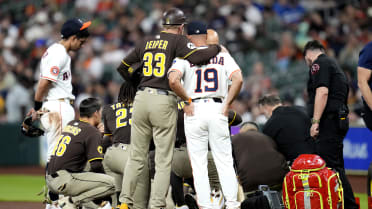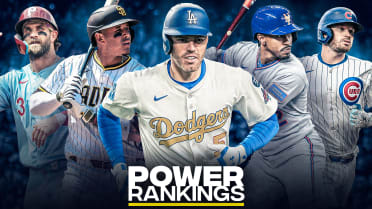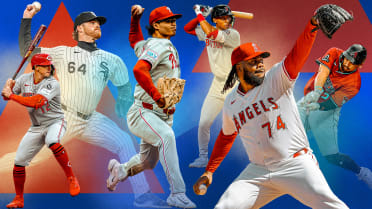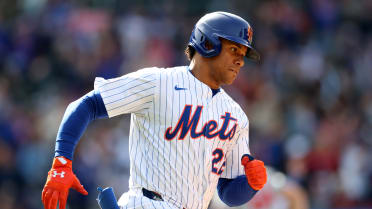Following the World Series, Yu Darvish has the ability to opt out of the remaining four years and $81 million on his contract with the Cubs, and ... well, look. Darvish turned 33 in August, in a free-agent climate increasingly frosty to older players. His first year in Chicago was an injury-plagued disaster. He's already alluded to the fact that he's probably not going to opt out, in part because his children enjoy Chicago.
But at the same time, he's also said that "I haven't decided yet" and "I’m not thinking anything about it right now," and because he was so good in the second half of the year -- and he absolutely was -- it's at least worth taking a second to think about. Considering how disappointing 2018 was for him, when he threw only 40 unimpressive innings before undergoing elbow surgery, it's a minor miracle this is even a discussion. And that's really the point: Because of how good he was, it's at least worth diving into. It's not something that he and his agent can just breeze through without thinking about.
First: Ignore the 6-8 record, because that doesn't tell us how well he pitched. Look past the 3.98 ERA, because that's not what teams will focus on. Realize that after an up-and-down start, Darvish was very legitimately one of the best starters in baseball, as he's been so often in the past.
Beginning with a start in St. Louis on May 31, and running through the end of the season, Darvish made 20 starts, pitching 123 2/3 innings. In that stretch, he posted a 162-to-18 strikeout-to-walk rate. (You may remember the five-start stretch starting in late July where he had 44 whiffs and issued zero walks.) He allowed a .198/.240/.389 line, essentially meaning that every batter he faced for four months hit like Tigers backup catcher John Hicks.
He was so good, in fact, that of the 143 starters who threw 50 innings after May 31, look at where he ranked.
Strikeout rate: 33.8%, tied-fifth
Walk rate: 3.8%, fifth
OBP allowed: .240, sixth
wOBA allowed: .263, seventh
You can reasonably say that over the final four months of the season that only Jacob deGrom, Gerrit Cole, Jack Flaherty and Justin Verlander were better starters. That might be it, and that's why this is at least a discussion. Darvish was that good.
So yes, he and his 10 different pitches are still very capable of being elite, and the list of teams who could benefit from adding a pitcher of his caliber stands at "literally all 30," even if all 30 wouldn't be in on him for various reasons.
Now, there's an additional problem here, and it's not just about the difficulty of topping $81 million for his age 33-36 seasons. (Only two starters have received more than that over the last two offseasons; one was Darvish, and one was Patrick Corbin, though Cole will certainly top that this winter.) It's that the Cubs would almost certainly extend a qualifying offer to him, and it was just last offseason that we saw how detrimental that's been to pitchers like Craig Kimbrel and Dallas Keuchel. (Because Darvish was acquired by the Dodgers during the season before he hit free agency, he was ineligible to receive a qualifying offer from L.A. Rules stipulate that the only players that can't get one are players who were traded during the season or who received one before. Darvish has never received a qualifying offer before, so the Cubs could give him one this offseason.)
But if he's willing to take the risk of a qualifying offer affecting his value, or there are reasons beyond just money, there's a few reasons to support it.
1) Because he'd probably be the second (or third) best starter on the market
We can easily agree that Cole, possibly with an AL Cy Young Award in hand, will be the most desirable starting pitcher available in free agency. Stephen Strasburg, who has his own opt-out decision to make, would likely be second if he opts out. But there is also a chance he doesn't, or at least uses the opt-out as leverage to get an extension with the Nationals, similar to what Clayton Kershaw did with the Dodgers last year.
And then: Hyun-Jin Ryu? Zack Wheeler? Madison Bumgarner? Jake Odorizzi? Cole Hamels? Dallas Keuchel? After that: lower-tier options like Rick Porcello, Homer Bailey, Wade Miley, Alex Wood, and so on?
You might prefer one or another over Darvish, but it's somewhat difficult to make the case. Ryu has been outstanding when healthy, but he hasn't made 30 starts since 2013. Bumgarner, Keuchel and Hamels have the name value, yet the name value of each may exceed the on-field value of the three somewhat similar soft-tossing lefties. Darvish just spent months as one of the best starters in the game, not just of this group. If he's out there, he's got a very favorable position in the starter market.
2) If the uncertainty in Chicago affects his thinking
It should go without saying that there's some uncertainty going on in Chicago right now, from the open managerial spot to Theo Epstein talking about how much change is likely to come this winter. Darvish needs to make his choice within five days of the end of the World Series, which doesn't give him enough time to know fully what the 2020 Cubs will look like -- they might not have even named a manager by then, and a new manager may bring a new coaching staff.
Look, for example, at the Giants: "Several potential free agents told The Chronicle in Atlanta last weekend that the next manager will factor into whether they return."
And look, also, at Darvish's effusive praise of Maddon, from late September, before it was announced Maddon would not be returning.
"He's a great person, not only a great manager," Darvish said to MLB.com's Jordan Bastian in late September. "Especially last year and the beginning of the year, he was so patient for me. That's why I feel really good right now, because of him."
Now, Maddon is gone, the near-term future of the Cubs is uncertain, and while none of this is more important than the salary he'd command, these things do play a factor, too.
3) If he might be more successful somewhere else
Darvish has said nothing but all the right things about his time with the Cubs. "This organization is perfect for me," he said near the end of September.
And yet: There are some numbers that at least make you wonder if this is the best place for him to succeed. For example, Darvish hasn't really had much luck at Wrigley Field as a Cub, by a considerable amount.
Home: 5.02 ERA // .310 OBP // .477 SLG // .336 wOBA
Away: 3.42 ERA // .282 OBP // .356 SLG // .282 wOBA
That 54 point gap in wOBA -- or Weighted On-Base Average, which is just like OBP if it gave more credit for extra-base hits than singles or walks -- is one of the largest in baseball. Over the last two years, 125 pitchers have faced 400 hitters both at home and on the road, and only four of them have had larger home-field disadvantages. (One, Germán Márquez, calls Coors Field home. Another, Sonny Gray, had a historic Yankee Stadium problem in 2018 before showing no splits with Cincinnati in 2019. We can't easily explain Shane Bieber or Luke Weaver.)
The second problem might be one with catching, where Willson Contreras routinely rates at or near the bottom of the pitch framing leaderboards. (He was tied for third weakest in 2019, and since his 2016 debut, he's been the second weakest in baseball.) It's probably not unrelated that after Darvish was paired with Contreras for his first five starts, 17 of the 20 starts in his post-May 31 run were caught by backup Victor Caratini.
Even within the obvious limitations of the catcher splits, it's hard to not notice that Darvish allowed a .249 OBP when Caratini was catching and a .351 OBP when Contreras was behind the plate. Yet because Contreras remains one of the better-hitting catchers in the game, it's difficult to see a time where he isn't the primary Cubs catcher in the near future.
These are not reasons, by themselves, for Darvish to opt out. The risk of a 33-year-old pitcher with a likely qualifying offer getting less than the $81 million he still has coming to him is strong, and that probably makes the decision for him. Perhaps more likely is that Darvish goes the Clayton Kershaw / CC Sabathia route of negotiating something more, perhaps a new contract or extended no-trade protection, in exchange for declining the opt-out.
A year ago, this would have been a laughable idea. Even now, it's somewhat unlikely. But the takeaway here is that Darvish was so good this season that the idea of him testing the market isn't impossible. There are reasons for him to consider it, like possibly reuniting with Maddon on a pitching-hungry Angels team, or going back to a Rangers team he spent so much time with or pitching to Austin Hedges on an up-and-coming Padres team. There's reasons for him to think about it. A year ago, there were absolutely nothing of the sort. That, in itself, is an achievement.
Mike Petriello is a stats analyst for MLB.com, focusing on Statcast and Baseball Savant, and is also a contributor to MLB Network.




